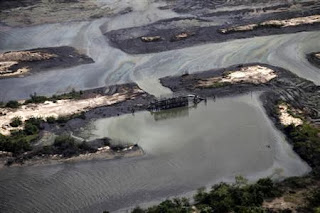REVEALED - How Nigeria's Stolen Oil Worth Billions Of Dollars Is Sold And Laundered Abroad

An estimated 100,000 barrels per day (bpd) of oil was stolen from pipelines in the Niger Delta in the first quarter of this year, the report by London-based Chatham House said, not including the unknown quantities stolen from export terminals.
The theft amounts to around 5 percent of Nigeria's current 2 million bpd production but has a wider impact because oil companies are often forced to shut down pipelines due to damage caused by thieves.
Nigeria is producing 400,000 bpd below its capacity, mainly due to theft and pipeline closures.
The activity costs Africa's second biggest economy an estimated $5 billion a year in potential revenue.
While oil majors like Royal Dutch Shell and Italy's Eni are often the first to complain about theft, it is unclear how much they are losing from it. A measure of acceptable losses may be keeping them from taking determined preventive action, the report said. Oil firms do not pay royalties on stolen oil.
"Nigerian crude oil is being stolen on an industrial scale. Proceeds are laundered through world financial centers and used to buy assets in and outside Nigeria," said the 70-page report, entitled "Nigeria's Criminal Crude".
"Thieves have many ways to disguise funds ... including cash smuggling, delayed deposits, use of middlemen, shell companies and tax havens, bribery of bank officials, cycling cash through legitimate businesses and cash purchases of luxury goods."
The report named the United States, Britain, Dubai, Indonesia, India, Singapore and Switzerland as likely money-laundering hotspots, and the United States, Brazil, China, Thailand, Indonesia and the Balkans as the most likely destination for stolen oil.
Nigeria's Oil Minister Diezani Alison-Madueke has called for stolen oil to be labeled "blood oil", arguing the security risk is similar to those in past and present mineral conflict zones such as Angola, Sierra Leone or Congo.
But the Chatham House report suggested violence associated with the theft is less than supposed, although the armed gangs involved have destabilized the oil-producing Niger Delta in the last decade.
However, the links between oil thieves, pirates and global criminal networks - including arms and drug traffickers - could feed broader insecurity in West Africa, it suggested.
The world's biggest cause for worry is the money laundering which poses reputational risks for the financial centers that facilitate it, said the report, the first independent, in-depth investigation into the international dimensions of Nigerian oil theft.

Comments
Post a Comment